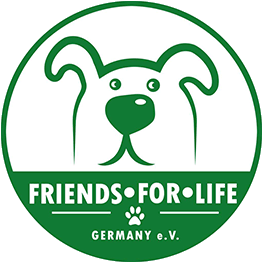 Anyone who buys a dog must be aware that they are not buying an accessory, but a family member for many years. Depending on the breed, a dog can live up to 15 years, some even longer. The four-legged friends want to spend as much time as possible with their family. To ensure that everyday life with your new cold-nosed friend is truly harmonious and enriching, you should take your time when choosing the right animal. We have collected a few tips on what you should look out for when choosing a dog.
Anyone who buys a dog must be aware that they are not buying an accessory, but a family member for many years. Depending on the breed, a dog can live up to 15 years, some even longer. The four-legged friends want to spend as much time as possible with their family. To ensure that everyday life with your new cold-nosed friend is truly harmonious and enriching, you should take your time when choosing the right animal. We have collected a few tips on what you should look out for when choosing a dog.
Finding the right breed
Of course, all puppies are cute. And of course there are breeds that will appeal to you more than others. And even though it cannot be denied that looks always play a not unimportant role when choosing a pet, you should not make your decision purely dependent on them.
But choosing a dog (also) according to its breed still makes sense. After all, the breed is not only associated with visual characteristics, but also with certain traits and character types. While fashion dogs like the Chihuahua were bred to entertain fine ladies, guard dogs like the Doberman are usually endowed with strong territorial behaviour and a strong protective instinct. Herding and working dogs such as the Border Collie, on the other hand, need plenty of exercise as they have been bred to work independently on livestock. Also, some breeds, such as the Great Dane, are known for their particularly gentle, friendly nature, while others, such as the Jack Russell Terrier, are more noticeable for their lively nature. And this is ultimately the great advantage of a pedigree dog over a mongrel: it is more predictable in its physical and character development, whereas mongrels actually always harbour a certain potential for surprise.
If you inform yourself about the breed-typical characteristics, the probable character of the future dog becomes predictable. Responsible breeders (you can find them on the VDH website, for example) will of course be happy to advise you on whether the breed you have chosen is compatible with your lifestyle and wishes.
Where should the puppy come from?
Which brings us to the next point: Namely, the question of where you should get your puppy in the first place. Because from the friendly neighbour whose bitch is accidentally expecting puppies, to the responsible breeder and the simple multiplier, to the organised, often cruel puppy trade, many things are possible here.
For the well-being of the animals, you should keep your hands off irresponsible breeders and the organised puppy trade – the conditions prevailing here are not only a cruel situation for the dogs, but also often result in serious illnesses, breeding damage and sometimes extreme behavioural disorders.
Signs of animal-friendly breeding are:
- The parents can be viewed.
- Raised in the family, so that the puppies know many everyday stimuli (hoover, cars, etc.).
- Detailed advice possible, the breeder takes his time.
- The puppies can stay with their mother at least until they are 8 weeks old – with many breeds it is even better if they are with their mother for 12 weeks.
- The puppies are wormed and have received their first vaccination.
Even if the wallet might be happy: You should be skeptical if the prices are too low. Because even if you have decided against a dog with papers from the breeder, you can still assume that a private person will incur various costs for species-appropriate puppy rearing, which the future owner will have to compensate for with the purchase price – even in the event of an accidental litter nobody wants to lose. Here, veterinary costs for the mother animal during pregnancy, whelping box, first aid for the young, worming, vaccination and vaccination card, puppy food and much more would be mentioned – even if the owner of the mother animal does not want to make a profit, several hundred euros per puppy can quickly add up. However, buying a sick or behaviorally disturbed rummage puppy from a breeder is significantly more expensive in the long term: In addition to the obvious cruelty to animals, it not only costs nerves, but also often causes high veterinary costs.
Yes, but which puppy now?
Now that the framework conditions have been clarified, the fine-tuning begins. A whole litter of cute puppies is romping around in front of you and you have to decide on one – choosing the puppies quickly becomes a torture, because of course you would prefer to take them all with you.
But the same applies here: A thorough selection can save a lot of trouble later. For example, if you have small children in the family, they are certainly better off with a rather robust puppy character than with a very sensitive puppy, which may quickly be traumatized by loud and rough children. If you have little experience with dogs, you should also refrain from dominant and very self-confident puppies, otherwise the four-legged addition to the family could quickly claim the leadership role in the family.
In order to find out which puppy is the right one, you have to deal with his personality above all. To get a good insight into the character of the little four-legged friend, you have various options:
Get detailed advice from the breeder or owner of the mother animal – because he has known “his” puppies for much longer and can better judge which behavior is typical for which puppies and which is more the exception. Even the wildest pup is sometimes tired and then acts falsely calm!
Take your time for the puppy selection – after just one meeting you will not be able to get a comprehensive picture, but after several visits the impression will become more and more multifaceted. That way you won’t experience any nasty surprises. Hopefully.
You should also carry out a puppy test (possibly with the help of an advising dog trainer) – this is possible from the 6th week of life. Here it is tested, for example, how much playfulness and the urge to explore the puppy has, but also how submissive or dominant it is. There are different approaches for this, from being picked up, to forced submission (dog on the back, hand on the chest), to retrieval and socialization tests.
In case of doubt…
Even if puppies are really cute, it should never be forgotten that it is a long, arduous road until the cute ball of fur grows into a well-behaved dog. That’s why it’s worth thinking about opting for an adult dog from an animal shelter as an alternative. This not only gives an animal a second chance, it also offers advantages. Because here you know what you are getting, because the character is already fully developed and in most cases there is already a basic education. Often, but not always. Animal protection dogs is a different topic, but we always prefer them – for the sake of the dogs.
But it doesn’t matter whether you decide on a puppy or an adult dog: It is important that the four-legged friend suits you and the family well. We hope that we were able to give you a few good suggestions for the selection of the new dog.

Every day we experience the wonders of nature with our dogs. This inspiration is the basis for our lives and our products. In our magazine we share with you our passion for these wonderful animals. Visit our socials and become part of the DOG FIT community.


Leave a Reply